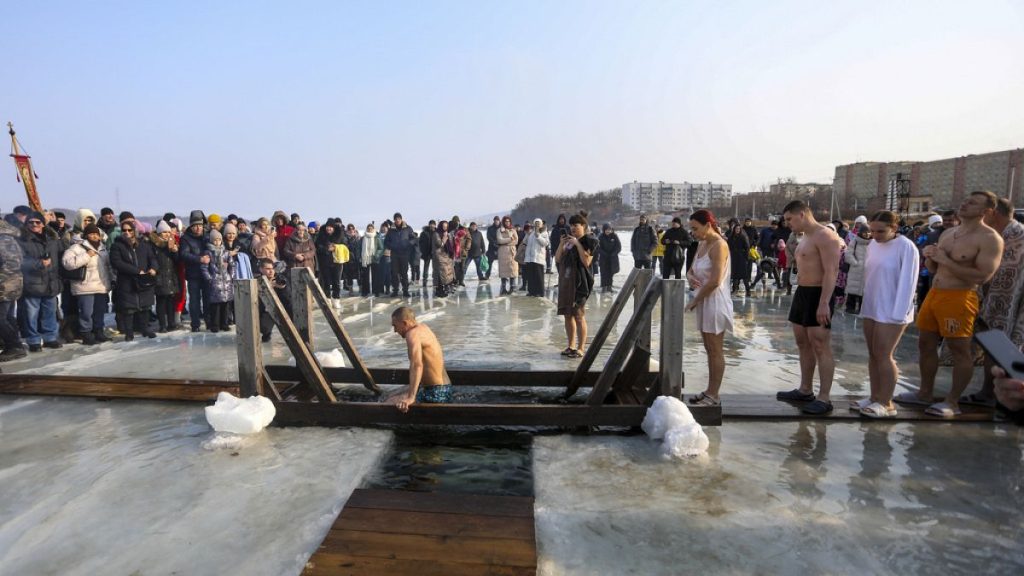The Orthodox Christian feast of Epiphany, celebrated on January 19th, traditionally involves a ritual immersion in icy waters, symbolizing spiritual cleansing and renewal. This year, however, the observance of this centuries-old tradition encountered a significant obstacle: unusually warm weather. While adherents in various regions, including Novosibirsk, Murmansk, South Ossetia, and even purportedly Russian soldiers in Ukraine’s Kherson region, partook in the icy plunge, numerous locations across Russia were forced to cancel their Epiphany bathing events due to unsafe ice conditions. The unseasonably mild temperatures rendered many rivers and ponds too precarious for the customary cutting of bathing holes. This disruption spanned a vast geographical area, affecting regions from Saratov in southern Russia to Karelia near the Finnish border, a distance of nearly 1,600 kilometers.
The impact of climate change on long-held cultural practices was starkly evident. Rising temperatures, a trend observed over the past quarter-century and consistent with global warming patterns, have made the traditional Epiphany ice dipping increasingly challenging. Meteorologist Leonid Starkov, affiliated with Moscow’s Gismeteo, confirmed that average temperatures were significantly exceeding the norm, with thaws occurring in St. Petersburg and Moscow, and temperatures reaching as high as 5 to 10 degrees Celsius in southern Russia. This warming trend has not only affected the feasibility of the Epiphany ritual but also underscores the broader environmental changes reshaping Russia’s climate.
The disruption forced officials to seek alternative solutions, creating designated bathing sites in smaller bodies of water where the ice remained thick enough to ensure safety. Though these alternative locations allowed the tradition to continue in some form, they highlight the adaptation required in the face of a changing climate. Even in these designated areas, the water remained frigid enough to evoke a visceral reaction from participants, who quickly wrapped themselves in towels upon emerging from the icy plunge. Onlookers, bundled in winter attire, braved the cold to witness the ritual, a testament to the enduring significance of this tradition.
Emergency services played a crucial role in ensuring the safety of participants. Rescue workers were stationed at the bathing sites, prepared to assist anyone experiencing adverse reactions to the shock of the icy immersion. This precaution underscores the inherent risks associated with the tradition, particularly in the context of fluctuating weather conditions. The presence of emergency personnel reflects a balance between respecting religious practices and prioritizing public safety.
The Russian Defence Ministry released footage showcasing servicemen participating in the Epiphany ritual, emphasizing the deep connection between Orthodox faith and Russian identity. A military priest, featured in the footage, underscored the spiritual and cultural significance of the tradition, invoking divine strength and fortitude for the soldiers. This portrayal of military participation in the ritual reinforces the narrative of Orthodox Christianity as a cornerstone of Russian culture and patriotism.
The Epiphany celebration in Russia is a powerful demonstration of faith and tradition. The ritual immersion in icy water is believed to cleanse the soul and strengthen the body, reflecting a deeply ingrained spiritual belief. However, this year’s observance was marked by the undeniable impact of a changing climate. The difficulties encountered in maintaining the tradition highlight the challenges faced by communities worldwide as they grapple with the consequences of global warming. The adaptation strategies employed, from relocating bathing sites to the increased presence of emergency services, reflect a growing awareness of the need to reconcile long-held traditions with the realities of a changing environment.














